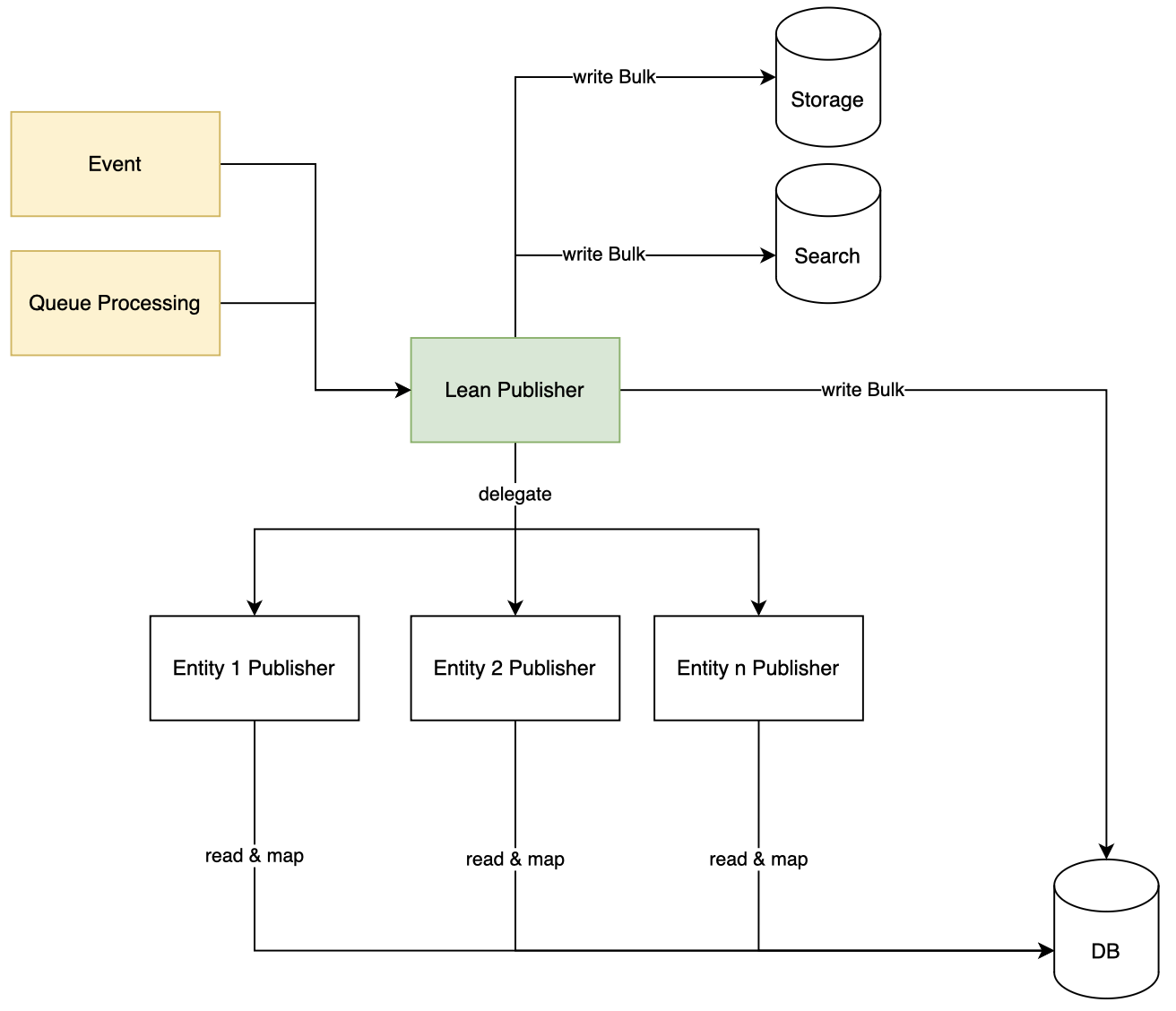aldidigitalservices / lean-publisher
Lean publishing module for Spryker
Installs: 1 100
Dependents: 0
Suggesters: 0
Security: 0
Stars: 3
Watchers: 3
Forks: 2
Open Issues: 1
pkg:composer/aldidigitalservices/lean-publisher
Requires
- spryker/event: ^2.9
- spryker/kernel: ^3.65
- spryker/log: ^3.13
- spryker/propel: ^3.34
- spryker/search: ^8.19
- spryker/storage: ^3.18
- spryker/synchronization: ^1.13
- spryker/util-encoding: ^2.1
This package is auto-updated.
Last update: 2026-02-14 21:50:54 UTC
README
Description
The Lean Publisher is a publication process that is based on sprykers "Publish & Synchronize" process (https://docs.spryker.com/docs/scos/dev/back-end-development/data-manipulation/data-publishing/publish-and-synchronization.html).
The goal of this process is to make data available in the frontend-centric data storages like Redis and Elasticsearch.
The Lean Publisher is meant to be used in connection with a spryker system.
Benefits
- Lean publisher centralizes all writing operations so that the connected modules do not need to think about bulk publishing
- The synchronization into Redis and Elasticsearch happens synchronously - preventing out of sync storage data
- The amount of queues, events and messages is drastically reduced which improves the performance of the RabbitMQ in high throughput environments
- The event mapping is improved and centralized in one place. Making the connection of the publisher processes easier to understand
- Provides a guiding structure for the implementing modules, so that there is not too many different approaches to publishing
Installation
composer require ALDIDigitalservices/lean-publisher
Integration
config_default.php
add "ALDIDigitalServices" to your CORE_NAMESPACES in config_default.php
$config[KernelConstants::CORE_NAMESPACES] = [ ... 'ALDIDigitalServices', ... ];
Console
In src/Pyz/Zed/Console/ConsoleDependencyProvider.php please register
[...] new LeanPublisherResynchronizationConsole(), [...]
Available commands:
docker/sdk console lean-publisher:sync $RESOURCE $IDS
with $RESOURCE beeing the resource you want to publish
and $IDS beeing a list of comma separated entity ids to publish
Event
In src/Pyz/Zed/Event/EventDependencyProvider.php register
[...] $eventSubscriberCollection->add(new LeanPublisherEventSubscriber()); [...]
Connecting your module to the Lean Publisher
If you want to connect your entity to the Lean Publisher you need to follow these steps:
Step 1: Create your publishing module
We suggest starting a module with "<ENTITY_NAME>Publish". So for example CategoryPublish, MerchantPublish etc.
Step 2: Create a new queue + retry queue
in src/Pyz/Zed/Queue/QueueDependencyProvider.php using the LeanPublisherQueueMessageProcessorPlugin
[...] <ENTITY_NAME>PublishConfig::PUBLISH_MY_ENTITY_QUEUE_NAME => new LeanPublisherQueueMessageProcessorPlugin(), <ENTITY_NAME>PublishConfig::PUBLISH_MY_ENTITY_RETRY_QUEUE_NAME => new EventRetryQueueMessageProcessorPlugin() [...]
Step 3: Register retry and error configuration in
In src/Pyz/Client/RabbitMq/RabbitMqConfig.php add
[...] <ENTITY_NAME>PublishConfig::PUBLISH_<MY_ENTITY>_QUEUE_NAME => [ static::ROUTING_KEY_RETRY => <ENTITY_NAME>PublishConfigConfig::PUBLISH_<ENTITY_NAME>_RETRY_QUEUE_NAME, static::ROUTING_KEY_ERROR => <ENTITY_NAME>PublishConfigConfig::PUBLISH_<ENTITY_NAME>_ERROR_QUEUE_NAME, ], [...]
Setup the new registered queue via console command.
docker/sdk console queue:setup
Step 4: Create a database table that follows the Lean Publisher conventions
<?xml version="1.0"?> <database xmlns="spryker:schema-01" xmlns:xsi="http://www.w3.org/2001/XMLSchema-instance" name="zed" xsi:schemaLocation="spryker:schema-01 https://static.spryker.com/schema-01.xsd" namespace="Orm\Zed\<MyModule>\Persistence" package="src.Orm.Zed.<MyModule>.Persistence"> <table name="MY_ENTITY_publish" identifierQuoting="true"> <column name="id_MY_ENTITY_publish" required="true" type="INTEGER" autoIncrement="true" primaryKey="true"/> <column name="reference" required="true" type="VARCHAR" size="255"/> <column name="key_search" type="VARCHAR" size="255"/> <column name="key_storage" type="VARCHAR" size="255"/> <column name="data_search" type="LONGVARCHAR"/> <column name="data_storage" type="LONGVARCHAR"/> <column name="store" type="VARCHAR" size="128" required="true"/> <index name="MY_ENTITY_publish-reference"> <index-column name="reference"/> </index> <unique name="MY_ENTITY_publish-unique-key_storage"> <unique-column name="key_storage"/> </unique> <unique name="MY_ENTITY_publish-unique-key_search"> <unique-column name="key_search"/> </unique> <id-method-parameter value="id_MY_ENTITY_publish_pk_seq"/> <behavior name="timestampable"/> </table> </database>
Create the new table via the console command:
docker/sdk console propel:schema:copy && docker/sdk console propel:model:build && docker/sdk console propel:diff && docker/sdk console propel:migrate && docker/sdk console transfer:entity:generate
Step 5: Create an EventHandler Plugin that implements Lean Publisher Interfaces
| Interface | Description |
|---|---|
| LeanPublisherEventHandlerPluginInterface | general Lean Publisher event handler interface. Needed for communication with the Lean Publisher. |
| LeanPublisherStoragePublishPluginInterface | If you want to publish to storage, you need this interface. |
| LeanPublisherSearchPublishPluginInterface | If you want to publish to search, you need this interface. |
Step 6: Register the EventHandler
In src/Pyz/Zed/LeanPublisher/LeanPublisherDependencyProvider.php::getEventHandlerPlugins()
return [ [...] <ENTITY_NAME>PublishConfig::PUBLISH_<ENTITY_NAME>_QUEUE_NAME => new <ENTITY_NAME>PublishEventHandlerPlugin(), [...] ];
Step 7: Create and register a PublisherTriggerPlugin
Create a PublishTriggerPlugin implementing both PublisherTriggerPluginInterface, LeanPublisherTriggerPluginInterface and set it up in
\Pyz\Zed\Publisher\PublisherDependencyProvider::getPublisherTriggerPlugins
return [ [...] new <ENTITY_NAME>PublishPublisherTriggerPlugin(), [...] ];
Step 8: Set up jobs to process the events
Depending on your setup you need to add jenkins jobs or other jobs to process messages from your publish.ENTITY_NAME queue

